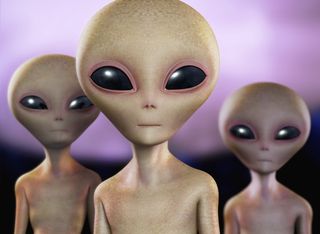
If aliens are out there, they may all be dead.
It might be relatively easy for life to evolve on hospitable planets throughout the universe, but very hard for it to get any kind of a foothold, a new study suggests.
This could be the answer, the study's authors say, to the famous Fermi Paradox, which in its simplest form asks, "Where is everybody?" [4 Key Questions in SETI's Search for Alien Life]
Chopra and co-author Charley Lineweaver, also of ANU, posit that environmental conditions on young planets are unstable, and there is thus likely only a small window of time for life to get going, even on initially hospitable worlds.
In the first 500 million years or so of a wet, rocky planet's life, for example, it will be too hot and heavily bombarded to support life. Life could emerge over the next 500 million years, as the planet cools and the impact rates settle down a bit.
During that time, however, the planet will probably be losing its liquid water, perhaps as the result of a runaway greenhouse effect (as occurred on Venus), or perhaps because it got too cold. There's a good chance that the planet will end up shifting from habitable to uninhabitable, as Venus and Mars apparently did, by roughly 1 billion to 1.5 billion years after its formation — unless life gets going fast enough to stabilize things, Chopra and Lineweaver say.
"Between the early heat pulses, freezing, volatile content variation, and runaway positive feedbacks, maintaining life on an initially wet rocky planet in the habitable zone may be like trying to ride a wild bull. Most life falls off," they write in the study, which was published in the journal Astrobiology. "Life may be rare in the universe, not because it is difficult to get started, but because habitable environments are difficult to maintain during the first billion years."
Get the Space.com Newsletter
Breaking space news, the latest updates on rocket launches, skywatching events and more!
The researchers term this idea the "Gaian bottleneck" hypothesis. They contrast it with the "emergence bottleneck" concept, which postulates that it's tough for life to get started at all. (Good news: Earth life has made it over both of these putative hurdles.)
It's unclear, of course, which of these hypotheses better represents reality, or if either of them represents reality well at all. But there are possible (albeit difficult and time-consuming) ways to test such ideas out, the researchers said.
"One intriguing prediction of the Gaian bottleneck model is that the vast majority of fossils in the universe will be from extinct microbial life, not from multicellular species such as dinosaurs or humanoids that take billions of years to evolve," Lineweaver said in the same statement.
You can read the new study for free here: http://adi.life/pubs/ChopraLineweaver2016.pdf
Follow Mike Wall on Twitter @michaeldwall and Google+. Follow us @Spacedotcom, Facebook or Google+. Originally published on Space.com.
Join our Space Forums to keep talking space on the latest missions, night sky and more! And if you have a news tip, correction or comment, let us know at: community@space.com.

Michael Wall is a Senior Space Writer with Space.com and joined the team in 2010. He primarily covers exoplanets, spaceflight and military space, but has been known to dabble in the space art beat. His book about the search for alien life, "Out There," was published on Nov. 13, 2018. Before becoming a science writer, Michael worked as a herpetologist and wildlife biologist. He has a Ph.D. in evolutionary biology from the University of Sydney, Australia, a bachelor's degree from the University of Arizona, and a graduate certificate in science writing from the University of California, Santa Cruz. To find out what his latest project is, you can follow Michael on Twitter.
